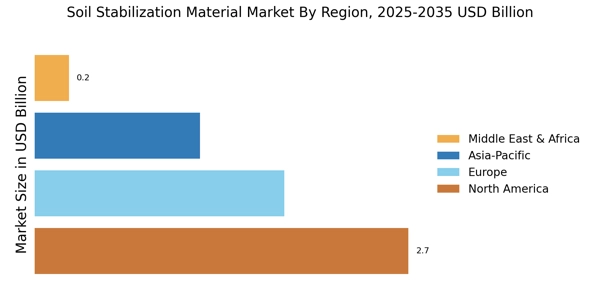Rising Environmental Concerns
Environmental sustainability is becoming increasingly critical in construction practices, influencing the Soil Stabilization Material Market. The need to minimize ecological footprints has led to a growing preference for eco-friendly soil stabilization materials. These materials often utilize recycled components or natural additives, aligning with global sustainability goals. Recent studies indicate that the market for green construction materials is expected to expand, with soil stabilization materials playing a pivotal role. As stakeholders prioritize environmentally responsible practices, the Soil Stabilization Material Market is likely to witness a shift towards innovative solutions that not only stabilize soil but also contribute positively to the environment.
Government Regulations and Standards
Government regulations and standards play a crucial role in shaping the Soil Stabilization Material Market. Many regions are implementing stricter guidelines to ensure the quality and safety of construction materials. These regulations often mandate the use of specific soil stabilization techniques and materials, thereby influencing market dynamics. Compliance with these standards can lead to increased demand for certified soil stabilization products. As regulatory frameworks evolve, the Soil Stabilization Material Market must adapt, potentially leading to innovations that meet or exceed these requirements, thus fostering a more competitive market landscape.
Increasing Infrastructure Development
The Soil Stabilization Material Market is experiencing a surge due to the increasing demand for infrastructure development. Governments and private sectors are investing heavily in road construction, bridges, and other civil engineering projects. This trend is driven by urbanization and the need for improved transportation networks. According to recent data, the construction sector is projected to grow at a compound annual growth rate of approximately 5% over the next few years. As a result, the demand for soil stabilization materials, which enhance the strength and durability of soil, is expected to rise significantly. This growth in infrastructure development not only boosts the Soil Stabilization Material Market but also encourages innovation in material technology, leading to more efficient and sustainable solutions.
Growing Demand in Agricultural Applications
The Soil Stabilization Material Market is also witnessing growth due to the increasing demand for soil stabilization in agricultural applications. Farmers and agricultural engineers are recognizing the benefits of soil stabilization techniques in enhancing soil quality and crop yields. The use of soil stabilization materials can improve water retention, reduce erosion, and enhance soil structure, which are vital for sustainable agriculture. Recent reports suggest that the agricultural sector is increasingly adopting these materials, leading to a notable rise in the Soil Stabilization Material Market. This trend not only supports agricultural productivity but also contributes to food security.
Technological Innovations in Material Science
Technological advancements in material science are significantly impacting the Soil Stabilization Material Market. Innovations such as the development of polymer-based stabilizers and bioengineering techniques are enhancing the performance of soil stabilization materials. These technologies improve the efficiency and effectiveness of soil stabilization processes, leading to better project outcomes. For instance, the introduction of nanotechnology in soil stabilization has shown promising results in enhancing soil properties. As these technologies continue to evolve, they are expected to drive growth in the Soil Stabilization Material Market, providing construction professionals with more effective tools to address soil-related challenges.

















